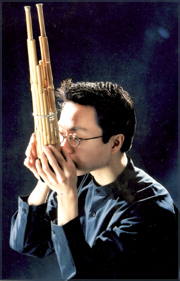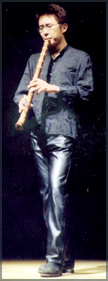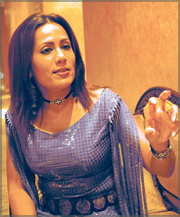|
dailynews |
|
|
|
|
|
OTHER LINKS |

|

|

|
|
Traditional Japanese music in ColomboA unit of three world acclaimed Japanese musicians, Hiromu Motonaga, Ai Kajigano and Naoyuki Manabe, will be in Sri Lanka shortly to put on a musical evening of traditional Japanese music blended with modern sounds.
The trio is scheduled to arrive in Colombo this week to give a concert at the Elphinstone Theatre, Colombo on September 12 from 7 pm. The concert is a part of a large tour starting in Nepal, Bangladesh and Calcutta before coming to Sri Lanka. The concert, "Sounds of Traditional Japan-Today", will be performed with traditional Japanese instruments. This will give a rare opportunity to Sri Lankan music lovers to experience true sounds of Japanese music played by a team of professionals. Similarly, it will be a rare opportunity for local musicologists and music students, to observe and experience how traditional Japanese musical instruments, such as Koto, Shou, Shakuhachi are played in harmony. "The Embassy of Japan and the Japan Foundation have organized the concert with a focus of promoting cultural exchange between the two countries," said First Secretary (Culture and Information) of the Japanese Embassy, Takashi Ato. Ato was speaking at a press conference organised to apprise the public on the concert. Admission will be free for Sri Lankans. Visitors are expected to be seated before 6.45 pm.
Ai Kajigano will play the Koto at the concert. The Koto is one of the most popular traditional musical instruments in Japan. It is a 13 string zither with about a 2 metre long sound board with movable bridges to tune the strings. It is played with an ivory plectrum held between the thumb and first two fingers of the right hand.
Ai Kajigano graduated from the NHK Academy for Japanese Traditional Music in 1998. She teaches music at Sawai Koto School, Tokyo. Her playing varies from classical to contemporary pop. Hiromu Motonaga plays the Shakuhachi - a Japanese traditional bamboo flute - a favourite instrument in Zen services. Hiromu is an open minded musician who started music from the age of four on violin. He has toured France, China, Germany, Thailand, New York, and Chicago. Shou, the reed with seventeen pipes, is played by Naoyuki Manabe, a musician working hard to popularize traditional court music or Gagaku music of Japan. If you are interested get in tune with some real Japanese music on Tuesday (12) at the Elphinstone Theatre, Colombo. Corrine, simple and arrogantCorrine Almeida admits that she is arrogant sometimes. The vocalist who can adjust her voice to sing any type of music, be it a song of Western pop or rock, or oriental baila or even a semi-classic, says she is least bothered about what the world says about her.
The following is an interview with Corrine done with a focus to find how she feels as a singer, how she feels about her surroundings and about herself. The artiste was met at Colombo Hilton lobby recently. Q: How do you describe yourself? A: I am a simple person, and can be arrogant sometimes depending on circumstances, and am least bothered about what the world says about me. Q: Was it your dream to become a vocalist? A: Well, it was not my dream. But I guess it's the talent I was having that pushed me through much to the influence I had from my family background. The air of music was a common experience in my house. My grand father was a pianist, the famous Clarence Lord. So music was somewhere down the line. Maybe it's in my blood. Q: In what way do you think that one should perform on the stage? What are the points to be remembered and followed? A: Ok, as a vocalist I think one should make sure that the audience is with him or her when he or she is performing on the stage. I'm saying that it is important to know the pulse of your audience. It's not just singing that takes place on the stage. Thank God, I have the ability to keep the audience with me wherever I perform. Q: New-wave groups say they have passed something new on to the current stream of music. Is it true or is it the extension of the old that is still there? A: I think it's the extension of the old. Over the past, a couple of months a lot of new singers have come up. But it's a sorry situation that they are more or less incompetent in the art of carrying their audiences with them. They have no idea how to interact with the audience. This way they cannot last long in the field. It's more difficult to sustain one's popularity once one becomes popular. I'm proud to say that I was able to delight my audiences through all these years. Q: Any admirable persons in your musical career? A: The only person I admire is my mom who has been with me right from the beginning. Q: Do you think that Sri Lankan music scene as developing? A: If you take the industry as a whole, I don't see it as getting anywhere in terms of making money. Q: What's your advice to up and coming young singers? A: Be yourself and don't imitate others. Q: Any new songs released by you? A: Yes, my CD "Yowun Wasanthaya" was released in May under the Torana label, which has 13 new songs. It's selling well. Q: What do you think of love? A: That's a tough one. That's an area I have failed. I don't wanna talk about it. Q: What is music to your life? A: It's part of my life. |













